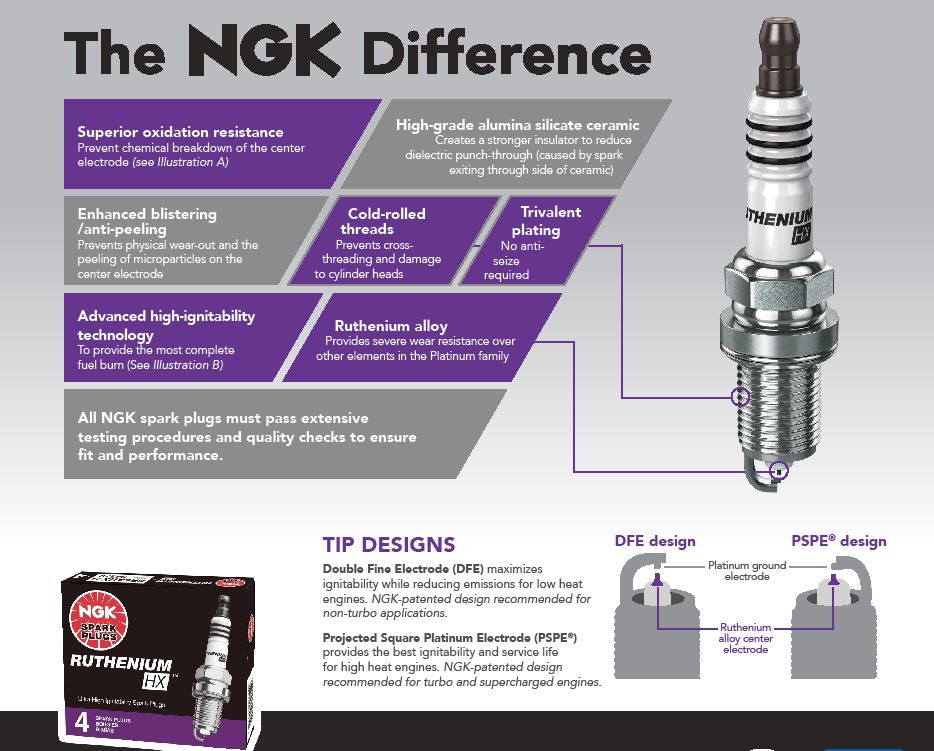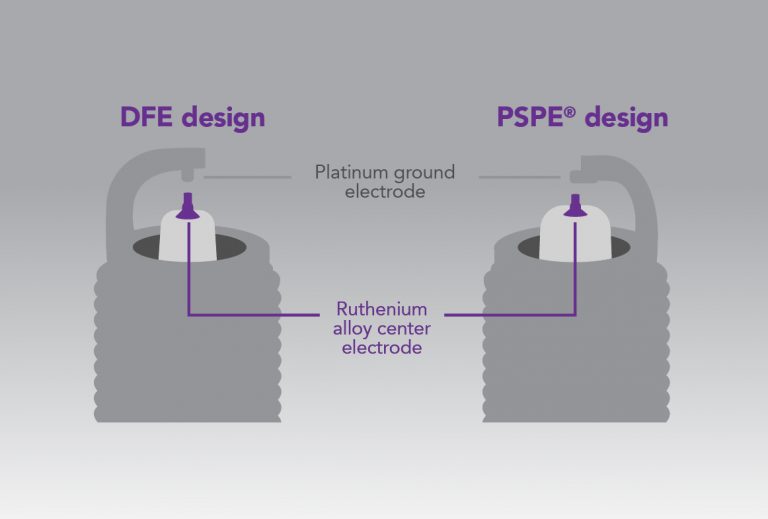As an Amazon Associate, I earn from qualifying purchases at no extra cost to you.
Comparing Ruthenium Spark Plugs to Iridium Spark Plugs?
Ruthenium spark plugs offer a cost-effective option, while iridium spark plugs provide longevity and performance. When comparing the two, consider your preference for durability and efficiency.
Ruthenium spark plugs are a budget-friendly choice that still offer good performance, making them suitable for regular driving needs. On the other hand, iridium spark plugs are known for their longevity and ability to withstand high temperatures, making them ideal for high-performance vehicles or heavy-duty usage.
Understanding the key differences between ruthenium and iridium spark plugs will help you make an informed decision based on your specific driving requirements and budget constraints.
Basic Spark Plug Function
Understanding the basic function of spark plugs is essential when comparing Ruthenium spark plugs to Iridium spark plugs. The spark plug is a crucial component in the ignition process of an internal combustion engine, responsible for igniting the air-fuel mixture within the combustion chamber.
Igniting The Air-fuel Mixture
The primary function of a spark plug is to ignite the compressed air-fuel mixture within the engine’s combustion chamber. This ignition process initiates the power stroke, ultimately driving the piston down and generating power for the vehicle’s propulsion.
Creating A Spark
Spark plugs are designed to create an electric spark that ignites the air-fuel mixture. This spark is produced by the electrical energy supplied from the ignition system, which jumps across the spark plug’s electrode gap, thereby igniting the fuel to initiate combustion.
Heat Dissipation
Effective heat dissipation is crucial for spark plugs to maintain optimal performance. The spark plug must efficiently dissipate the immense heat generated during the ignition process to prevent overheating and ensure prolonged functionality.

Credit: glenbrookautoparts.com
Ruthenium Spark Plugs
Ruthenium spark plugs offer improved ignitability and durability compared to iridium spark plugs. With better conductivity and high melting point, Ruthenium plugs provide enhanced performance and efficiency for your vehicle’s engine, making them a reliable and cost-effective choice.
Composition And Properties
Ruthenium spark plugs are composed of a small amount of ruthenium metal, known for its durability and resistance to wear.
Advantages
- Longevity: Ruthenium spark plugs have a longer lifespan compared to traditional spark plug materials.
- Efficiency: They offer improved engine efficiency and enhanced performance due to their consistent spark.
- Compatibility: Suitable for a wide range of vehicles, making them a versatile choice.
Disadvantages
- Cost: Ruthenium spark plugs can be more expensive upfront compared to other types of spark plugs.
- Availability: They may be less widely available in the market compared to more common spark plug materials.
Iridium Spark Plugs
Iridium Spark Plugs are renowned for their exceptional performance and longevity in the world of spark plugs.
Composition And Properties
Iridium Spark Plugs are composed of a fine wire center electrode made from iridium, a rare and precious metal known for its durability and high melting point.
Advantages
- Durable: Iridium Spark Plugs have a long lifespan, making them a cost-effective choice.
- Efficient: They provide a strong spark for optimal engine performance.
- Fuel Economy: Iridium Spark Plugs can help improve fuel efficiency due to their precise ignition.
Disadvantages
- Cost: Iridium Spark Plugs are typically more expensive than other types, initially.
- Compatibility: Not all vehicles are compatible with iridium spark plugs, so compatibility must be checked.
- Maintenance: While they have a long lifespan, regular maintenance is essential for optimal performance.

Credit: m.youtube.com
Performance And Durability
When it comes to choosing the right spark plugs for your vehicle, the performance and durability are crucial factors to consider. In this discussion, we will compare Ruthenium spark plugs to Iridium spark plugs and evaluate their performance and durability based on ignition performance, fuel efficiency, and longevity and maintenance.
Ignition Performance
Ruthenium spark plugs are known for their superior spark focus, resulting in improved ignition performance. With a smaller electrode diameter, they provide a more precise spark, enhancing the overall engine performance.
In contrast, Iridium spark plugs also offer exceptional ignition performance, characterized by their ability to withstand high temperatures and pressures. Their fine-wire electrodes ensure a consistent spark, promoting smooth engine operation and acceleration.
Fuel Efficiency
Ruthenium spark plugs are designed to optimize fuel efficiency by ensuring complete combustion and minimizing energy loss. This leads to improved fuel economy and reduced emissions, making them an environmentally-friendly choice.
On the other hand, Iridium spark plugs are also engineered to enhance fuel efficiency by maintaining stable combustion and maximizing engine power. Their efficient spark delivery contributes to better fuel economy and reduced fuel consumption.
Longevity And Maintenance
Ruthenium spark plugs are built to offer impressive longevity, requiring less frequent replacement compared to traditional spark plugs. Additionally, their durable construction minimizes maintenance needs, providing long-term reliability.
Conversely, Iridium spark plugs are renowned for their extended lifespan due to the robust nature of Iridium material. This results in reduced maintenance intervals and long-lasting performance, ensuring consistent ignition over an extended period.
Suitability For Different Engines
When it comes to maximizing the performance and efficiency of your engine, choosing the right spark plugs is crucial. Two popular options in the market are ruthenium spark plugs and iridium spark plugs. Each type has its own advantages and is suitable for different types of engines. In this article, we will explore the suitability of both ruthenium and iridium spark plugs for high-performance engines, turbocharged engines, and older engines.
High Performance Engines
For high-performance engines that demand optimum power and durability, both ruthenium and iridium spark plugs deliver exceptional performance. However, there are certain differences that make one more suitable than the other depending on the specific requirements of the engine.
Ruthenium spark plugs are known for their excellent conductivity and enhanced ignition capability, making them an ideal choice for high-performance engines. The unique alloy composition of ruthenium allows for better heat dissipation, which is crucial in engines that reach high temperatures. Additionally, ruthenium spark plugs offer improved durability and can withstand the intense conditions often encountered in high-performance engines.
On the other hand, iridium spark plugs are also highly recommended for high-performance engines due to their superior strength and longevity. The iridium alloy used in these spark plugs provides exceptional resistance to wear, ensuring consistent performance over extended periods. Moreover, iridium spark plugs offer precise and efficient spark ignition, resulting in improved fuel combustion and increased power output.
Turbocharged Engines
Turbocharged engines generate increased power by forcing more air into the combustion chamber. These engines operate under higher pressure, temperature, and stress, requiring spark plugs that can withstand such conditions and provide reliable ignition.
Ruthenium spark plugs are well-suited for turbocharged engines as they offer better thermal conductivity and resistance to erosion. The ability to dissipate heat efficiently allows ruthenium spark plugs to withstand the intense temperatures generated in turbocharged engines. Additionally, their excellent erosion resistance ensures longevity and consistent performance even in highly demanding conditions.
Iridium spark plugs also prove to be an excellent choice for turbocharged engines. With their high melting point and exceptional strength, iridium spark plugs can handle the increased stress and pressures experienced in these engines. Furthermore, their fine-tipped electrode design enables precise spark ignition, resulting in improved combustion and increased engine efficiency.
Older Engines
Older engines often require spark plugs that can accommodate their specific ignition system and combustion characteristics. When it comes to these engines, both ruthenium and iridium spark plugs offer reliable performance and longevity.
Ruthenium spark plugs are known for their compatibility with a wide range of ignition systems, including those found in older engines. They offer excellent heat dissipation and resistance to fouling, ensuring smooth and efficient ignition. Additionally, the durable construction of ruthenium spark plugs allows them to withstand the harsh conditions and reduced maintenance commonly associated with older engines.
Iridium spark plugs, too, are an apt choice for older engines. Their reliable ignition capability and exceptional longevity make them suitable for engines with traditional ignition systems. Iridium spark plugs ensure consistent combustion and reduce the risk of misfires, enhancing the overall performance and fuel efficiency of older engines.

Credit: ngksparkplugs.com
Cost Considerations
When it comes to choosing the right spark plugs for your vehicle, one of the key considerations is the cost. Understanding the cost implications of different types of spark plugs can help you make an informed decision for your vehicle’s maintenance. In this article, we will compare the cost considerations of Ruthenium Spark Plugs and Iridium Spark Plugs, two popular options in the market.
Initial Cost
When it comes to the initial cost, there is a notable difference between Ruthenium Spark Plugs and Iridium Spark Plugs. Ruthenium Spark Plugs tend to be more affordable compared to their Iridium counterparts. This can be an appealing factor for vehicle owners looking for a budget-friendly option. However, it’s important to note that the initial cost of spark plugs is just one aspect to consider in the overall cost equation.
Maintenance Cost
In addition to the initial cost, maintenance cost is an essential aspect to consider when choosing spark plugs. Ruthenium Spark Plugs generally have a longer lifespan compared to Iridium Spark Plugs. This means that vehicle owners using Ruthenium Spark Plugs may not need to replace them as frequently, resulting in potential savings in the long run. On the other hand, Iridium Spark Plugs may require more frequent replacement, which can increase the maintenance cost over time.
Moreover, considering the performance benefits offered by Ruthenium Spark Plugs, it’s worth noting that their long-lasting nature can provide a more cost-effective solution. They are designed to withstand extreme conditions, ensuring consistent performance and reducing the need for frequent replacements.
In conclusion, while the initial cost of Ruthenium Spark Plugs may be lower compared to Iridium Spark Plugs, the long-term cost savings and enhanced performance make them a compelling option to consider. By prioritizing quality and durability, vehicle owners can make a wise investment that not only benefits their wallets but also keeps their engines running smoothly.
Conclusion
After comparing ruthenium and iridium spark plugs, it’s clear that both offer unique advantages. While ruthenium spark plugs provide better ignitability and durability, iridium spark plugs offer enhanced efficiency and longevity. Ultimately, the choice depends on the specific needs of your vehicle.
Consider consulting a professional for personalized recommendations.


